- Home
- Julia James
Carrying His Scandalous Heir Page 2
Carrying His Scandalous Heir Read online
Page 2
After all, no one knew better than she what that might lead to. Hadn’t it happened to her own mother? Falling for a man who, when he’d been faced with unintended pregnancy, had not wished to commit to her?
Although his father had cracked the financial whip and forced a marriage, there had been no happy ending. Her father had chafed at marriage, chafed at fatherhood—and had been on the point of leaving her mother when he was killed. Was it any wonder, Carla asked herself, that she was wary of making such a mistake herself?
So, for every reason of good sense, there was only one reply for her to make to this arrogant, sensual man who possessed the power to disturb her senses.
Yet she could not say the words. Could only find the means to give a slight, fleeting, demurring half-smile, and a self-protective sweeping down of her eyelashes to hide the all too revealing response in her eyes as she made an evasive reply.
‘So...have you loaned any other paintings to the exhibition?’ she asked.
Her voice sounded abrupt, even breathless, but she did not care. She met his gaze head-on, keeping hers quite limpid, though the effort was great—the more so since in his eyes was a look of knowingness that told her he had understood immediately why she had not answered him.
But to her relief he followed her diversion.
‘Indeed,’ he murmured, still with that semi-amused look in his eyes that was so disturbing to her. ‘The Luciezo is, in fact, part of a triptych. The other two portraits are on display across the gallery.’
There was a discernible tinge of annoyance in his voice at the curator’s decision as he indicated across the width of the gallery, towards an alcove in which Carla could make out two portraits.
‘Shall we?’
The cool voice held assumption, and Carla found herself being guided forward. He halted, lifting his hand to the portraits they were now in front of.
‘What do you make of them?’
Carla’s trained eyes went to the portraits, immediately seeing the skill and artistry in them, seeing in them all the hallmarks of a master. Her eyes narrowed very slightly. But not Luciezo.
‘Caradino?’ she ventured.
She felt rather than saw the glance the Count threw at her. Surprise—and approval.
‘Caradino,’ he confirmed. He paused. ‘Many attribute his few surviving works to Luciezo.’
She gave a slight shake of her head. ‘No,’ she said. ‘There is a discernible difference.’
Her eyes ran over the portraits, taking in the brushwork, the lighting, the shadows. Her gaze went from appraising the technicalities of the portraits to the subjects themselves. And then, for the first time, her eyes widened as her gaze rested on their faces.
So unalike. So very, very unalike.
One so fair and pale. A married woman, clearly, as illustrated by the tokens in the painting—her pearl earring, the sprig of myrtle in her lap, the dish of quinces on the little table at her side—and yet there was about her, Carla could see, an air almost of virginity...as if with different garments and accoutrements she might have modelled for a painting of the Virgin Mary.
A crucifix was in her hands, glinting between her long, pale fingers. Carla looked at the woman’s eyes.
Sadness. As if, like the Virgin Mary, she had in her gaze a foretelling of the great sorrows that were to come.
She pulled her gaze away. Let it rest on the other woman’s face.
Another young woman. In this portrait the subject’s hair was a lush chestnut-brown, lavishly unbound and snaking down over one bare shoulder. Her gown was a sumptuous red, not a celestial blue, and cut low across her generous bosom to reveal an expansive amount of soft, creamy skin. She held red roses in her hands, rubies gleamed at her throat and on her fingers, and her hands rested on her abdomen—its slight swell discreet, but undeniable.
Carla drew her eyes away from the telltale curve of the young woman’s figure, moved them back up to scrutinise her face. Beautiful, in a sensuous way, framed by her rich tresses, her cheeks flushed, lips full and with a sensual cast to them. Carla’s eyes went to the woman’s eyes and held them for a long moment—held the unseeing gaze that looked out over the centuries between the two of them.
‘Who are they?’
Her own voice cut short her perusal, and she drew her gaze away to look back at il Conte, standing at her side.
‘Can you not tell?’ he asked. He glanced back to the portrait of his ancestor, across the room, then back to Carla. ‘His wife—and his mistress. He had them painted at the same time, by the same hand. Caradino stayed at my castello and painted them both—one after the other.’
Carla’s face stilled. ‘How nice for them,’ she said drily. ‘It seems your ancestor kept his mistress...handy.’
But the Count did not rise to her sardonic comment. ‘It was quite normal in those times. Nothing exceptional. Both women knew and understood the situation.’
Carla’s lips pressed together. ‘Knowing and understanding are not the same thing as tolerating and agreeing,’ she riposted.
The dark, hooded eyes were veiled. ‘Women had no power in those times. And after all,’ he went on, ‘my ancestor’s mistress was very lavishly looked after.’
‘She’s carrying his child,’ Carla retorted.
She could feel an emotion rising up in her—one she did not want to feel, but it was coming all the same.
‘An excellent way to secure the Count’s protection,’ agreed Cesare. ‘I believe they had several children, over the years. He was very faithful to her, you know. Surprisingly so for the times.’
Automatically Carla’s eyes went not to the mistress of the former Count but to his wife. No sign of fertility there—and in the eyes only that haunting sadness.
Thoughts ran through her head, unstoppable.
How did she feel? How did she cope? Knowing her husband was having children, openly, with his mistress? Yet presumably she, too, must have had an heir, at least, or the line would have died out—which it obviously hasn’t?
‘But enough of my ancestors—have you seen the other paintings displayed here yet?’
The voice of the man at her side drew her back to the present. She turned towards him. Saw him with fresh eyes, it seemed. Her gaze went past him to the portrait of Count Alessandro, who had been so unconcerned as to have his wife and mistress painted simultaneously.
A shaft of female indignation went through her, as she brought her gaze back to the current Count.
‘Not all of them yet, no,’ she said. She made her voice purposeful. ‘And I really must. I have fifteen hundred words to write up about the exhibition.’
She named the arts magazine she wrote for, as if she was aware that by stressing her professional interest she would diminish her personal one.
‘And I must do my duty by all the paintings here!’
She spoke lightly but deliberately. She smiled. An equally deliberate smile. One that completely ignored the question he had asked her only a few minutes ago, making no reference to it.
‘Thank you so much, Signor il Conte, for showing me these fascinating portraits, and for giving me such insight into them. It’s always enhancing to learn the origins and the circumstances of a portrait’s creation—it brings it so to life! And especially since the artist Caradino is so seldom exhibited.’
She smiled again—the same social smile—signalling closure. For closure, surely, was essential. Anything else would be...
Her mind veered away, not wanting to think of the path she had not taken. The yielding she had not made.
Instead she gave the slightest nod of her head in parting and walked away. Her high heels clicked on the parquet flooring and as she walked she was intensely conscious of his following gaze, of how her shapely figure was outlined by the vivid tailored dress she was wearing. Inten
sely conscious of the urge overwhelming her to get away. Just...away.
As she walked, she sipped at her champagne again. She felt the need of it. Her colour was heightened, she knew—knew it from the hectic beating of her heart.
He desires me—the Conte di Mantegna has looked at me and found me pleasing to him...
Into her head sprang an image, immediate and vivid, conjured out of her ready imagination. That woman in the portrait—the brunette—working, perhaps, in her father’s shop, or sweeping floors, or even toiling out in the fields in sixteenth-century Italy... Il Conte passing by, seeing her, liking her beauty, taking a fancy to her. Finding her pleasing to him. Lifting her with one beckoning of his lordly, aristocratic hand out of her hard, poverty-stricken life to dress her in a silk gown and place roses in her hands and jewels around her throat, and take her to his bed...
She felt the pull of it—the allure. Had to force herself to remember all that would have gone with it. The price that woman would have paid.
To know that her place in his life was only ever to be his inamorata—never to aspire to be his wife.
And as for the Count—oh, he would have had everything he wanted. His pale, subservient wife—his compliant, obliging mistress.
Having it all.
She dragged her mind away, making herself inspect the other paintings, consult her catalogue, interview the exhibition’s curator, and then get a few words from the gallery’s director, who greeted her warmly, both in her professional capacity and as the stepdaughter of the late chairman of a global hotel chain—a generous patron of the arts himself.
It had been her stepfather who’d first noticed her interest in art as a teenager, and it was thanks to him that she’d studied history of art at prestigious universities both in England and Italy. He’d encouraged her in her journalistic career. It was a career she found immensely satisfying, and she knew herself to be extremely fortunate in it.
Now, with all her notes taken, she was ready to leave. She’d spend the evening going through them, drawing up the article she would write.
As she made her farewells she found herself glancing around. She knew who it was she was trying to glimpse. And knew why she should not be. Cesare di Mondave was far too disturbing to her peace of mind to allow herself to have anything more to do with him.
He was not to be seen anyway, and she told herself she was glad. Relieved. Because to further her acquaintance with Cesare di Mondave would not be good sense at all.
Involuntarily her eyes went to the portrait of his ancestor—Count Alessandro, regarding the world in all his High Renaissance splendour, his dark gaze compelling, arrogant. In her mind’s eye she saw his wife and his mistress. Two women, rivals for ever, their destinies yoked to the man who had commissioned their portraits.
Had they both loved him? Or neither?
The question hovered in her head, its answer long consumed by the centuries that had passed. All she could know, with a kind of ironic certainty, was that it would not be wise for any woman to have anything to do with the man in whose veins ran the blood of Luciezo’s Count Alessandro.
It didn’t matter that his descendant could have an impact on her that she had never encountered before. That his dark lidded eyes could raise her pulse in an instant...that her eyes had wanted only to cling helplessly, hopelessly, to his sculpted, powerful features, that her hand had yearned to reach towards him, graze the tanned skin of his jaw, brush the sensual swell of his mouth... It didn’t matter at all.
Because letting herself get embroiled with the arrogant, oh-so-aristocratic Count of Mantegna would be folly indeed!
She was not, and never would be, like the lush beauty in the Caradino portrait, haplessly dependent upon the Count’s continuing desire for her, fearing its demise. Her lips thinned slightly. Nor could she ever be like the woman in the other portrait—oh, she might move in Roman high society, but the Viscaris were hoteliers: rich, but with no trace of aristocratic blood. Carla knew without flinching that when il Conte chose a wife, it would be a woman from his own background, with an ancestry to match his.
I would be nothing more than an...an interlude for him.
She walked out onto the pavement and into the warm evening air of Rome in late summer. A low, lean, open-topped car was hovering at the kerb, blatantly ignoring the road signs forbidding such parking. Its powerful engine was throbbing with a throaty husk, its scarlet paintwork was gleaming, and the rearing stallion on the long bonnet caught the light, glinting gold like the crested signet ring on the hand curved around the wheel.
The man at the wheel turned his head. Let his dark, lidded gaze rest on Carla.
‘What kept you?’ asked Cesare di Mondave, Conte di Mantegna.
CHAPTER TWO
CESARE’S HAND RESTED on the leather curve of the steering wheel. Impatience was humming in him. He appreciated that she had a job to do—this woman his eyes had lit upon, drawn without conscious intent to her dramatic beauty, her voluptuous figure, the extraordinarily dark blue eyes that had a hint of violet in them—but for all that he did not care to be kept waiting.
He’d known who she was before he’d made the decision to approach her—he’d seen her about previously in society, even though the aristocratic circles he moved in overlapped only loosely with those of the Viscaris. The Viscaris were, to him, ‘new money’—it was a mere handful of generations since the global hotel group that bore the family name had been founded at the end of the nineteenth century. They were newcomers compared to the immense antiquity of his family—and Cesare felt the weight of that antiquity upon him each and every day.
It was a weight that both upheld him and imposed upon him responsibilities to his ancestry that others could not understand. A duty that reached far back into the Middle Ages, stretching across all his estates from the high Apennine lands leased as a national park, to forests and vineyards, agricultural land and olive groves, and across all his many properties. Every palazzo was a historic monument, including the magnificent baroque Palazzo Mantegna here in Rome, now on loan to the nation and housing a museum of antiquities. And all those estates and properties came with tenants and employees whose livelihood he guaranteed—just as his ancestors had.
Yet at the heart of it all was the ancient Castello Mantegna, the heart of his patrimony. Within its mighty walls, built to withstand medieval warfare, he had spent his childhood, roaming the forests and pasturelands that one day would be his.
Was that something anyone not born to such a heritage could truly understand? The weight of inheritance upon him?
Or did they merely see il Conte—a wealthy, titled man who moved in the uppermost echelons of society, with a cachet that many would only envy? And which women would eagerly seek to bask in...
His dark eyes glinted. There had been no such eagerness in Carla Charteris, though he’d made clear his interest in her. He was glad of it—but not deterred by it. For his long experience of woman had told him immediately that the first flare of her violet-hued eyes as he’d addressed her had showed that she was responsive to him. That was all he’d needed to know—their barbed exchange thereafter had merely confirmed it. All that was required now was for her to acknowledge it.
He leant across to open the passenger side door. ‘Prego,’ he invited in a pleasant voice.
He’d surprised her—he could tell. Had she really believed that walking away from him would discourage him?
He went on in a dry voice, ‘It would gratify me if you complied without delay, for the traffic warden over there—’ he nodded carelessly along the street to where such an individual had recently turned the corner ‘—would so very much enjoy booking me.’ He gave a brief sigh. ‘I find that officials take particular pleasure in exercising their petty authority when their target is driving a car like this one.’
He smiled. He could see the conflict i
n her eyes—in those amazingly dark violet-blue eyes of hers—but above all he could see that same flare of awareness, of desire, which had been in them when he’d first approached her. That told him all he needed to know.
His expression changed again. ‘Carpe diem,’ he said softly. His eyes held hers. Tellingly, unambiguously. ‘Let us seize all that we may have of this fleeting life,’ he murmured, ‘before we are dust ourselves.’
His casual reference to her own comment in front of the Luciezo was accompanied by an exaggerated gesture of his hand as he again indicated the seat beside him.
His lashes dipped over his eyes. ‘What is so difficult,’ he murmured, ‘about accepting an invitation to dinner?’ His gaze lifted to hers again, and in his eyes was everything that was not in his words.
Carla, her expression immediately urgently schooled, stopped in her tracks on the pavement, felt again that incredible frisson go through her whole body—that shimmer of glittering awareness of the physical impact he made on her.
All around her the city of Rome buzzed with its familiar vitality. The warmth of the early evening enveloped her, and she could hear the noise of the traffic, the buzz of endless Vespas scooting past. The pavement was hot beneath the thin soles of her high heels. While in front of her, in that outrageously expensive car—as exclusive and prestigious as its driver so undoubtedly considered himself to be—the oh-so-aristocratic Conte invited her to join him.
As she had before, in the gallery, she felt the overwhelming impact of the man. Felt even more powerfully the impulse within her to give him the answer that he was waiting for.
Thoughts—fragmented, incoherent—raced through her.
What is happening to me? Why now—why this man of all men? This arrogant, lordly man who is scooping me up as if I were no more than that woman in the portrait—scooping me up to serve his pleasure...

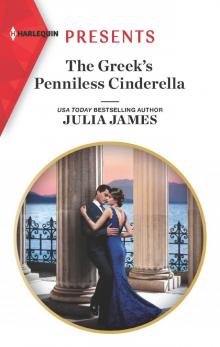 The Greek's Penniless Cinderella
The Greek's Penniless Cinderella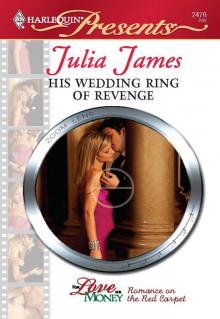 His Wedding Ring of Revenge
His Wedding Ring of Revenge Irresistible Bargain with the Greek
Irresistible Bargain with the Greek Billionaire's Mediterranean Proposal
Billionaire's Mediterranean Proposal The Dark Side of Desire
The Dark Side of Desire His Penniless Beauty
His Penniless Beauty Bought ForThe Greek's Bed
Bought ForThe Greek's Bed For Pleasure...Or Marriage?
For Pleasure...Or Marriage? Carrying His Scandalous Heir
Carrying His Scandalous Heir Captivated by the Greek
Captivated by the Greek The Mistress's Secret
The Mistress's Secret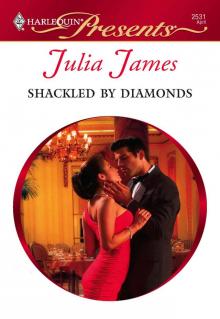 Shackled by Diamonds
Shackled by Diamonds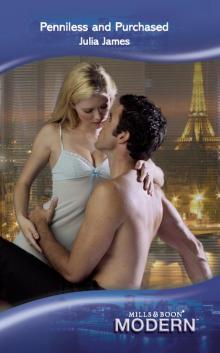 Penniless and Purchased
Penniless and Purchased The Greek's Virgin Bride
The Greek's Virgin Bride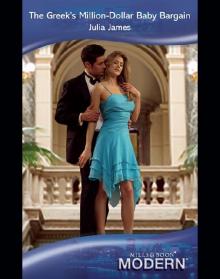 The Greek's Million-Dollar Baby Bargain
The Greek's Million-Dollar Baby Bargain Forbidden or For Bedding?
Forbidden or For Bedding?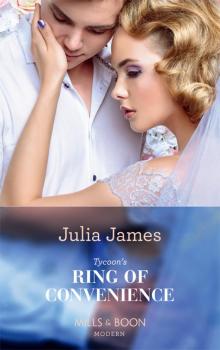 Tycoon's Ring of Convenience
Tycoon's Ring of Convenience Royally Bedded, Regally Wedded
Royally Bedded, Regally Wedded From Dirt to Diamonds
From Dirt to Diamonds The Forbidden Touch of Sanguardo
The Forbidden Touch of Sanguardo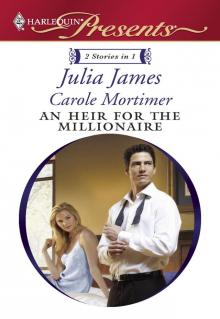 An Heir for the Millionaire
An Heir for the Millionaire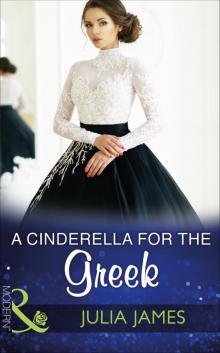 A Cinderella for the Greek
A Cinderella for the Greek Painted the Other Woman
Painted the Other Woman Securing the Greek's Legacy
Securing the Greek's Legacy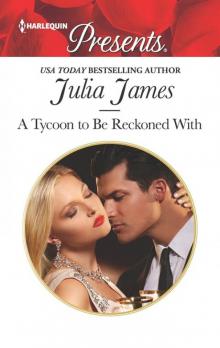 A Tycoon to Be Reckoned With (Harlequin Presents)
A Tycoon to Be Reckoned With (Harlequin Presents) Summer Sins
Summer Sins